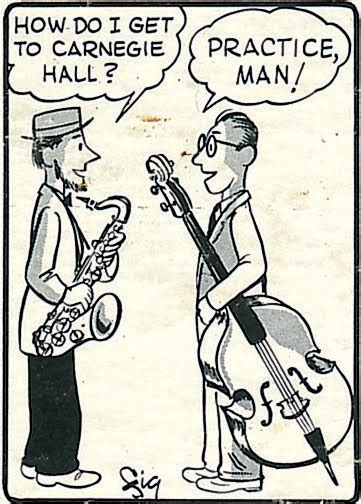The Carnegie Hall Joke's Surprisingly Profound Meaning
The simple joke, "How do you get to Carnegie Hall?" — "Practice, practice, practice!" — is far more than a punchline. Its seemingly straightforward answer holds surprising depth and resonates across various aspects of life, far beyond the realm of musical performance. This seemingly simple joke speaks volumes about dedication, perseverance, and the often-overlooked process behind achieving greatness. Let's delve deeper into its surprisingly profound meaning.
What Makes the Carnegie Hall Joke So Enduring?
The enduring appeal of this joke lies in its universality. While directly related to musical mastery, the message transcends musical talent. The core principle – consistent, dedicated effort – applies to any field of endeavor. Whether you're striving for athletic excellence, academic success, entrepreneurial triumph, or personal growth, the underlying principle remains the same: consistent practice is the key.
Is it Really Just About Practice? What About Talent?
This leads to a common question: Isn't natural talent important? The answer is a nuanced yes and no. While innate ability can provide a head start, raw talent without diligent practice rarely leads to mastery. Think of it like this: talent is the seed; practice is the nurturing sun, water, and soil that allow that seed to blossom into a magnificent tree. Carnegie Hall isn't filled with performers solely based on inherent gifts; it's filled with those who honed their natural abilities through relentless practice.
What Kind of Practice is Most Effective?
This brings us to another important point: What constitutes effective practice? Simply putting in hours isn't enough. Effective practice involves focused, deliberate effort, identifying weaknesses, and working on them strategically. It's about continuous improvement, learning from mistakes, and refining one's skills. It's not about quantity alone, but quality of practice. This applies to any skill; whether it's mastering a musical instrument, learning a new language, or improving your public speaking abilities, the principles remain the same.
Beyond Musicians: How Does This Apply to Other Fields?
The message of the Carnegie Hall joke extends far beyond the concert hall. Consider these examples:
- Sports: Elite athletes aren't born; they are made through years of rigorous training and practice.
- Business: Successful entrepreneurs aren't overnight sensations; they often dedicate countless hours to refining their business plans, networking, and adapting to market changes.
- Academics: Top students don't just passively absorb information; they actively engage with the material, practice problem-solving, and seek out opportunities for growth.
- Personal Development: Whether it’s learning a new skill, improving a relationship, or overcoming a personal challenge, consistent effort is crucial.
The Importance of Perseverance in the Face of Challenges
The joke's message also subtly highlights the importance of perseverance. The path to Carnegie Hall is rarely smooth; it's filled with challenges, setbacks, and moments of doubt. The joke implicitly acknowledges these difficulties, suggesting that consistent practice is the answer to overcoming these obstacles.
The Carnegie Hall Joke and the Power of Mindset
Finally, the joke speaks to the power of mindset. It suggests a proactive, solution-oriented approach. Instead of lamenting the difficulty of achieving a goal, the joke emphasizes the importance of taking consistent action. This positive, proactive attitude is crucial for success in any endeavor.
In conclusion, the seemingly simple joke about Carnegie Hall offers a profound and enduring message: consistent, dedicated practice is the key to achieving mastery and realizing one's full potential. It's a reminder that success is rarely an accident; it's the result of deliberate, persistent effort.

